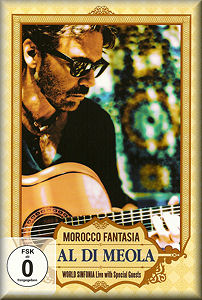1. Misterio
2. Siberiana
3. Double Concerto
4. Michaelangelo's 7th Child
5. Gumbiero
6. Turquoise
7. Encore
8. Egyptian Danza
Al Di Meola - Guitar
Fausto Beccalossi - Accordion
Peo Alfonsi - 2nd guitar
Gumbi Ortiz - Percussion
Victor Miranda - Bass
Peter Kaszas - Drums
Said Chraibi - Oud (tracks 7, 8)
Abdellah Meri - Violin (tracks 7, 8)
Tarik Ben Ali - Percussion (tracks 7, 8)
Al Di Meola continues to release albums which display an eclectic bundle of influences. This one was recorded at the Mawazine Festival in Rabat, Morocco, in 2009, with musicians representing a wide range of cultures and styles. It is almost an acoustic session, as Al plays an amplified acoustic guitar alongside Fausto Beccalossi's accordion.
Misterio has an oriental feel to it, with the accordionist whistling and Di Meola showing his dexterity on the guitar. The music is interrupted by shots of Morocco, sometimes pointlessly speeded up - and this is one feature which makes the DVD difficult to watch. The film switches from one musician to another every few seconds and the music is continually hindered by shots of Moroccan scenes. Is this a concert or a travelogue? It certainly interferes with one's concentration.
The variety of styles continues with Siberiana, which has a Spanish air. Al Di Meola comes across like a guitar hero, with his fingers flashing over the guitar strings in rapid flamenco style. Astor Piazzolla's Double Concerto starts with Al rhapsodizing on his own before the accordion comes in as the second member of the double concerto. Guitar and accordion play contrapuntally or follow in one another's footsteps.
Michaelangelo's 7th Child is another showpiece for Di Meola, this time with an Italian atmosphere. The accordionist also shines, proving himself a virtuoso on a par with such masters as Richard Galliano. Gumbiero opens with a solo by the conga drummer, after which the accordion shadows the guitar - these two working empathically together, as they do throughout the concert. Turquoise is an appealing tune: Al Di Meola has learnt from his erstwhile boss, Chick Corea, how to write complex tunes, although he often lacks Corea's talent for creating memorable melodies (Al wrote all but track 3 on this album).
For the closing two encores, the band is joined by three guests - a violinist, an extra percussionist, and a player of the oud (a lute-like instrument). These bring an enhanced Arabic influence to the music. Egyptian Danza includes some musical fireworks from Al and his guests, ending the concert exhilaratingly.
There are a number of "Extras" tacked onto the DVD, including a look at a rather short-tempered Di Meola in rehearsal; some visits to the bazaar, with Al playing there and in other Rabat locations; and some photos of Al. The most worthwhile extra is the Mawazine Suite, with Al performing thoughtfully with his guests. It is a mystery why this is not included in the main body of the DVD.
Musically this DVD is fine - an educated mix of world music and jazz - but its impact is lessened by the frantic camerawork which jumps about hastily from one shot to another and the unnecessary interpolation of Moroccan scenes which add little to the overall effect.
Tony Augarde
www.augardebooks.co.uk
